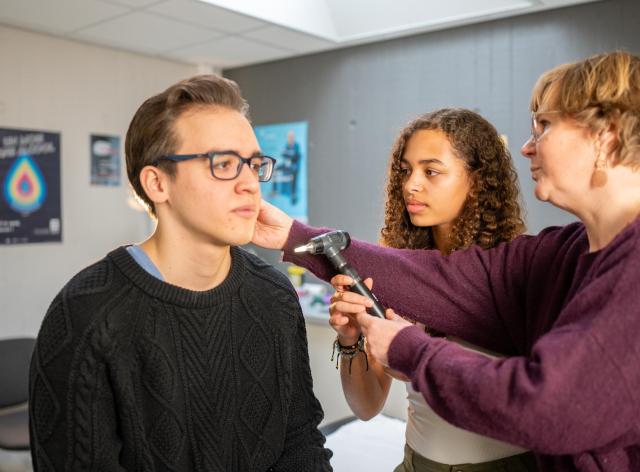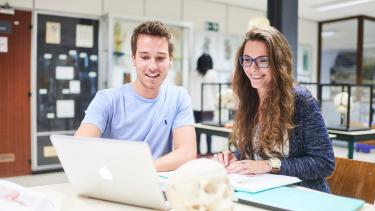The fight against disease is both a science and an art. Knowledge of human beings, pathologies and medicines is the key to fighting disease. But the essence of the medical art is practiced in contact with patients, who are looking for a doctor who is rigorous, with solid knowledge and sound reasoning, but who is also deeply warm and human.
Spotlight
News
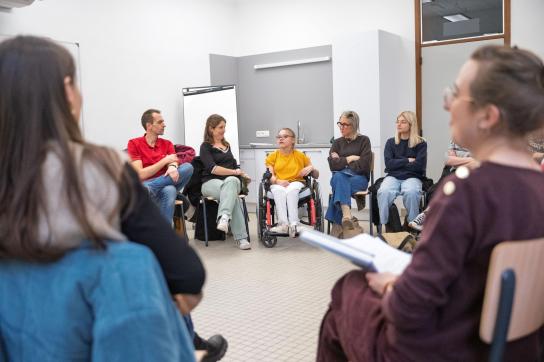
Master's students specializing in general medicine meet people with disabilities
Master's students specializing in general medicine meet people with disabilities
On December 4, second-year students in the Master's program specializing in general medicine at UNamur enjoyed a unique training day. They had the opportunity to interact directly with residents of Château Vert, an institution that welcomes people with disabilities. The goal was to better understand their expectations of general practitioners and improve the quality of medical care for these patients with specific needs.
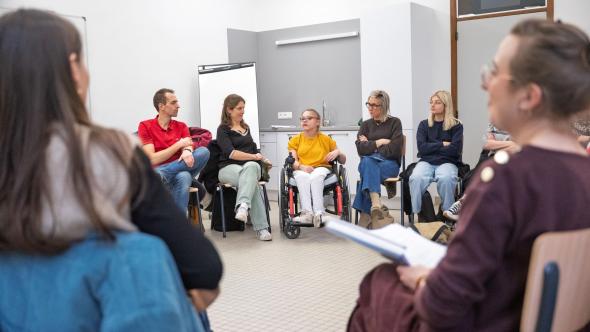
This was a first for UNamur: for the first time, several residents of Château Vert made the trip to the Faculty of Medicine to meet students enrolled in the Master's program specializing in general medicine. The trip required a significant investment of time and energy on the part of the Château Vert teams and residents. "The residents made the effort to come to us. It is a rare gift to be able to talk directly with patients and their caregivers," says Catherine Magnette, general practitioner and organizer of the day. "Who better than the patient themselves, and possibly their close caregiver, can express their expectations of their general practitioner? It is about putting the patient back at the center by giving them a voice," she continues.
Three workshops to better understand and provide better support
The day was structured around three workshops, offered as part of the academic curriculum for the Master's degree specializing in general medicine:
- "Dys" disorders
: Understanding learning and communication difficulties and adapting medical practices. - The specificities of medical care for people with disabilities
To better understand patients' vulnerabilities and skills in order to individualize care. Certain pathologies or medical issues are specific to these patients and are rarely addressed in the basic curriculum. - Meeting with the residents of Château Vert and their caregivers
A moment of direct exchange, where students were able to ask questions, listen to life experiences, and hear what patients expect—or fear—in a medical consultation.
Enriching testimonials
"I expect my general practitioner to be kind, but above all to take the time to explain clearly what they are going to do and why they are treating me. I need them to speak slowly because my brain takes longer to understand than other people's. It's very important for me to understand the situation," - Cassie (17), resident at Château Vert.
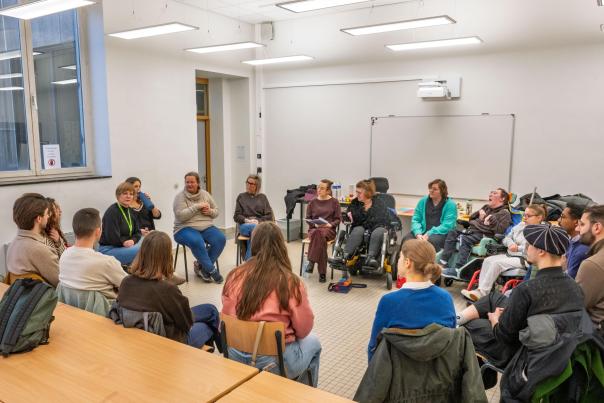
"What I expect from a doctor is that they put themselves in my shoes and understand my pain, even if I can't always express it very precisely." - Christelle, resident at Château Vert.
"It's really important for doctors to be able to put themselves in their patients' shoes. For example, with my son, explaining the medical tests he's going to have to undergo by miming them beforehand on his cuddly toy is an approach that really works. It reassures him." - Audrey, mother of Arthur (9), resident at Château Vert.
After hearing these testimonials, the students were able to ask questions and talk with the residents, their caregivers, and the supervisory teams.
Medical studies pay too little attention to the specificities of caring for people with disabilities. This day provides an opportunity to enrich the training of future doctors in inclusive care.
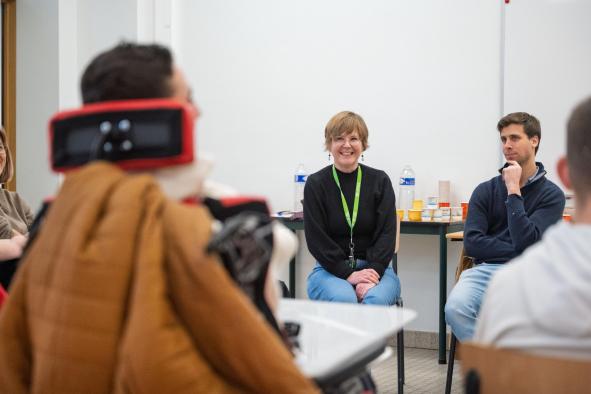
The educational objectives of this day were therefore multiple:
- Identify the medical, relational, and social specificities related to disability;
- Use this knowledge to improve patient care;
- To understand the role of those who support people with specific needs;
- Develop a patient-centered, respectful, and collaborative care model.
Studies
Discover medical training and the Master's degree in general medicine at UNamur
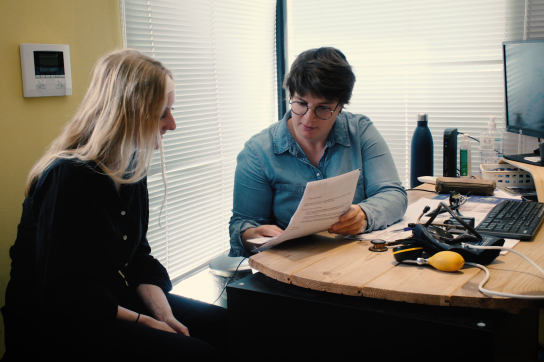
Faced with medical shortages, UNamur proposes an innovative solution: integrated internships in disadvantaged areas
Faced with medical shortages, UNamur proposes an innovative solution: integrated internships in disadvantaged areas
UNamur was a pioneer in creating, in 2014, an internship in General Medicine, compulsory for all bachelier 3 students. Faced with a growing shortage of general practitioners in several areas of Belgium, the University of Namur is launching a new concrete and ambitious initiative: sending bachelier 3-level trainees to medically under-resourced regions.
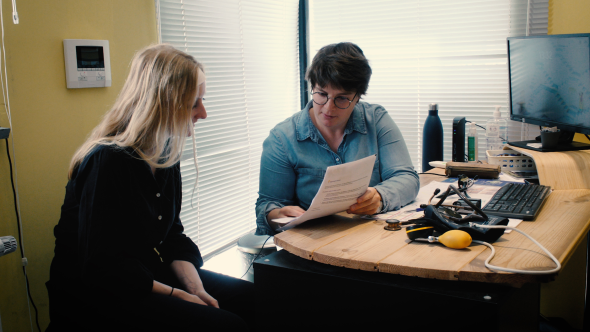
The aim of these internships is to raise medical students' awareness of these regions, in the hope that some of them will return to do their assistantships or even settle there permanently as GPs. This initial immersion in the field creates a concrete link with local realities and sparks a genuine return dynamic.
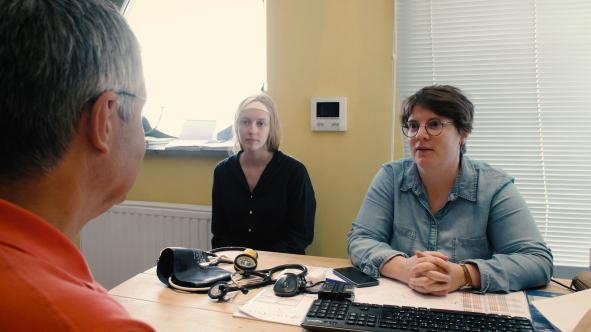
Organized by UNamur, this project is based on close collaboration with doctors based in the areas concerned, who will play a central role as tutors and partners in the field.
The proposal stands out for its "all-in-one" formula: students benefit from a supervised internship, accommodation on site, as well as organized transport when necessary. This scheme aims to remove any logistical obstacles that might discourage young people from going to train in these areas.
The first edition of this "all-in" internship took place during June 2025 in the commune of Florennes, with the active support of the local authorities. This pilot project marks an important step in validating the proposed model.
Other communes, such as Libin, Ohey and Bouillon (in collaboration with Santé Ardenne), have already expressed interest in hosting the program in 2026.
How long is the internship? How many students are doing this internship?
Discover the project in pictures :
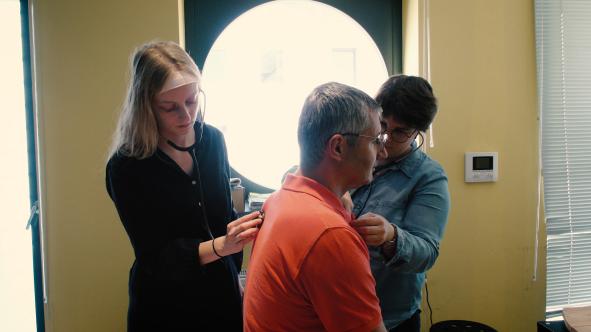
A call for support from local authorities
If this initiative is to take full shape, the support of the communes concerned is essential. The involvement of local authorities, particularly in providing housing and facilitating travel, is a prerequisite for the success and sustainability of this program.
UNamur therefore calls on the communes to commit themselves alongside us to this supportive and structuring approach for the future of the Belgian healthcare system.
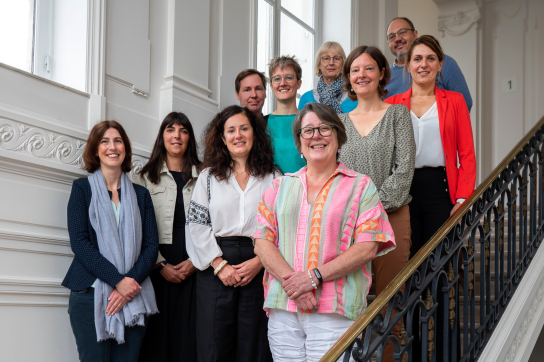
UNamur and Mutualité chrétienne form partnership to better understand shortage of general practitioners in rural areas
UNamur and Mutualité chrétienne form partnership to better understand shortage of general practitioners in rural areas
The University of Namur (UNamur) and Christian Mutuality (MC) announce a groundbreaking collaboration aimed at better understanding and combating the shortage of general practitioners in rural areas. This partnership is part of the Observatoire Universitaire en Médecine Rurale (OUMRu), launched in 2023 by UNamur.
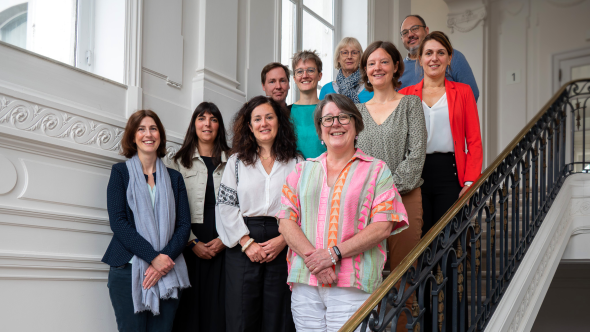
This partnership involves the co-financing of an ambitious, multidisciplinary research project conducted by UNamur over a 4-year period. Objectives? To understand the various mechanisms contributing to the disparity in the supply of general practitioners in Wallonia, and to objectify shortages on a local scale.
A strategic partnership
This project contributes directly to the MC's commitment to improving access to healthcare. By supporting research, the MC helps to orient healthcare policies towards the real needs of territories. The approach is a valuable lever for strengthening an equitable and sustainable healthcare offer, in phase with the values of solidarity carried by the MC.

"For UNamur, it is also vital to be able to act on this theme of accessibility to care, not only in our research, but also by including this dimension right from the training of future health and care professionals. Thanks to this partnership with Mutualité chrétienne, we will be able to count on the added value of a high-performance ecosystem while benefiting from MC's expertise in the field."
This project marks the first formal collaboration between UNamur and the MC, bringing UNamur's research to the attention of those working in the field and the general public. The Observatoire Universitaire en Médecine Rurale, which brings together general practitioners, sociologists and geographers, will benefit from the expertise and network of the MC to carry out its field surveys and applied research projects.
The project marks the first formal collaboration between UNamur and the MC, enabling UNamur's research to be brought to the attention of those working in the field and the general public.Objectives and expected results
More specifically, the project has three specific objectives:
- Understand the mechanisms behind the disparity in the supply of general medicine in Wallonia, and in particular in the province of Namur.
- Create an index of the attractiveness of practice locations for young doctors.
- Evaluate the perception of accessibility to care in general medicine from the point of view of patients.
Expected results include the creation of specific indices and the formulation of recommendations to improve the situation in shortage areas. These results will be promoted via multiple channels: academic training at UNamur, the scientific community, the medical sector, politics, the general public.
The project will focus on three complementary phases:
- Evolution of the GP profession in rural areas : This qualitative phase includes semi-directive interviews with GPs to understand the transformations of the profession and identify factors influencing the attractiveness of rural areas.
- Attractiveness of practice locations for young doctors: An attractiveness index will be refined and implemented in a Geographic Information System (GIS) to assess locations conducive to the installation of young practitioners.
- Accessibility to care for patients: A mixed analysis of quantitative and qualitative data will enable us to understand patients' perceptions of accessibility to care in rural areas.
The project therefore has the particularity of taking into account both the point of view of patients and healthcare providers in order to provide a 360° overview of the problem of the scarcity of supply in general practice, and in rural areas in particular.
Previous research projects
This project extends two research projects already carried out as part of the OUMRu:
- Rurality index for the Walloon Region: From December 2023 to April 2024, geographer Aliz Hevesi, under the direction of Catherine Linard (NARILIS-ILEE Institutes), created a rurality index at sub-municipal level, relevant for assessing situations of shortage at local level. This research also included work on the theoretical definition of an attractiveness index for young practitioners.
- Perception of accessibility to care: From January to June 2025, sociologist Amélie Pierre (Institut Transitions), in collaboration with Dr. Dominique Henrion, coordinator of the OUMRu, is conducting a study to assess the perception of accessibility to general medical care in different regions, by interviewing a panel of 5.000 Belgian citizens via "The Social Study", as well as focus groups of patients in the provinces of Namur and Luxembourg.
About UNamur
Founded in 1831, the mission of the University of Namur (UNamur) is teaching, research and community service. UNamur comprises: 7 Faculties, 1 Inter-faculty Department, 11 Research Institutes and 10 Technology Platforms. It is home to over 7,300 students of 75 different nationalities and also has over 1,300 staff members.
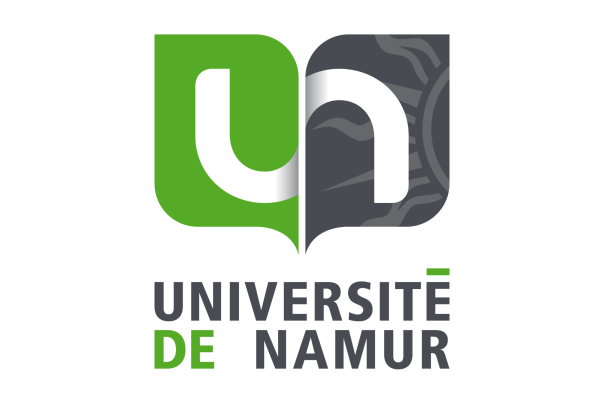
About Christian Mutuality
With 1,125,000 members in French- and German-speaking areas, the MC defends quality healthcare accessible to all. It offers solidarity-based services, where everyone contributes to the health of all. Through its insurance products, it offers professional support tailored to individual needs. It also contributes to health policies and encourages health-promoting behavior.
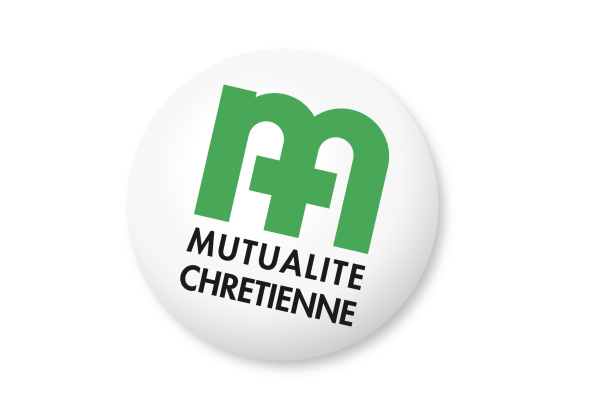
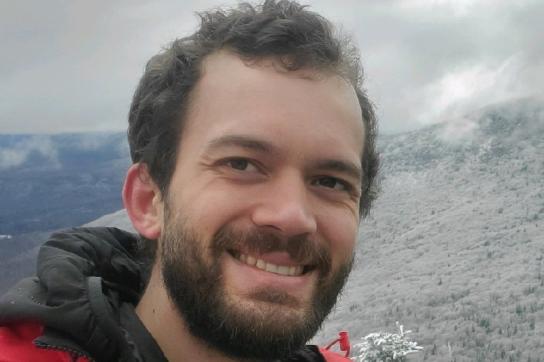
Thomas Balligand: from Medicine to Fundamental Research at UNamur
Thomas Balligand: from Medicine to Fundamental Research at UNamur
Thomas Balligand, now a lecturer at UNamur, combines his passion for basic research with teaching in histology and cytology. After a diverse background in internal medicine and research, notably at Harvard, he is dedicated to training the next generation of scientists while pursuing his work on nanobodies and their potential in immunotherapy. His desire to awaken scientific curiosity in his students illuminates his new role at the university.
.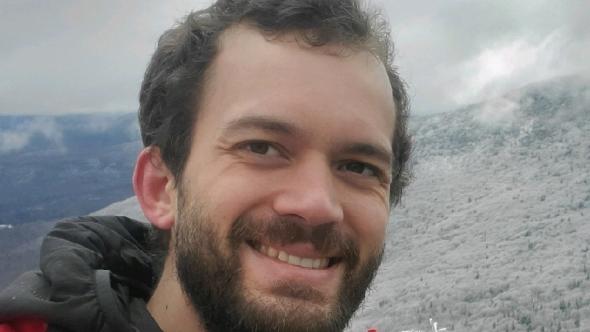
The University of Namur enthusiastically welcomes Thomas Balligand, who recently joined its ranks as a lecturer. Graduating in medicine from UCLouvain in 2012, Thomas first proved himself as an assistant in internal medicine at the Grand Hôpital de Charleroi, where he was able to progress in several specialties such as cardiology, gastroenterology and pneumology. His career path also took him to CHU Saint-Luc, where he deepened his knowledge of nephrology.
Throughout his career, Thomas has developed a keen interest in research. His academic career began when he became a research student in Prof. Emile Van Schaftingen's laboratory at the Institut de Duve, an opportunity offered to medical students at UCLouvain to introduce them to basic research. This experience was decisive for him, as it made him realize later on that clinical practice was not entirely in line with his aspirations. He then decided to devote himself to a thesis in basic research, working under Prof. Stefan Constantinescu at the de Duve Institute to explore signaling pathways in hematopoiesis, with a particular focus on myeloproliferative syndromes.
From 2015 to 2019, Thomas was a 100% Télévie-funded researcher, which enabled him to immerse himself deeply in his research work. At the end of his PhD, he had the choice of continuing his medical assistantship or embarking on a career as a post-doctoral researcher. He opted for research, continuing his path at Harvard in 2020, where he worked on nanobodies with applications in applied biology. This experience led to concrete results, illustrated by a collaborative article with his colleague Xin Lui, showing how nanobodies binding to circulating immunoglobulin light chains enabled the development of a treatment for influenza. He has thus contributed to the creation of universal antiviral coverage, capable of tackling all flu variants, not just seasonal strains.
In parallel, Thomas also explored the use of lectins to target virus-infected cells or cancer cells, underlining his interest in the potential therapeutic applications of his research. In 2024, he joined UNamur as a lecturer, replacing Yves Poumay, where he passes on his knowledge of histology and cytology while continuing his fundamental research work.
"I'm passionate about awakening scientific curiosity in young people. I've already been able to mentor several students in Boston, PhD students and memoranda students. I appreciate the role of mentor", explains Thomas Balligand. At UNamur, he is forging collaborations with colleagues Stéphane Vincent, Yoann Wouters and Xavier De Bolle, and benefits from CDR funding for his projects.
he will soon set up his own research group within the Molecular Physiology Research Unit (URPhyM, NARILIS, UNamur).
His ambition is to work on the glycosylation phenomena of transmembrane proteins, in particular to target cancerous or virus-infected cells through his research on lectins, as well as the use of nanobodies in the field of immunotherapy. With his expertise and passion for research, Thomas Balligand is well positioned to advance research at UNamur while inspiring the next generation of scientists.
Find out more about medical studies at Unamur
More about Narilis

Master's students specializing in general medicine meet people with disabilities
Master's students specializing in general medicine meet people with disabilities
On December 4, second-year students in the Master's program specializing in general medicine at UNamur enjoyed a unique training day. They had the opportunity to interact directly with residents of Château Vert, an institution that welcomes people with disabilities. The goal was to better understand their expectations of general practitioners and improve the quality of medical care for these patients with specific needs.

This was a first for UNamur: for the first time, several residents of Château Vert made the trip to the Faculty of Medicine to meet students enrolled in the Master's program specializing in general medicine. The trip required a significant investment of time and energy on the part of the Château Vert teams and residents. "The residents made the effort to come to us. It is a rare gift to be able to talk directly with patients and their caregivers," says Catherine Magnette, general practitioner and organizer of the day. "Who better than the patient themselves, and possibly their close caregiver, can express their expectations of their general practitioner? It is about putting the patient back at the center by giving them a voice," she continues.
Three workshops to better understand and provide better support
The day was structured around three workshops, offered as part of the academic curriculum for the Master's degree specializing in general medicine:
- "Dys" disorders
: Understanding learning and communication difficulties and adapting medical practices. - The specificities of medical care for people with disabilities
To better understand patients' vulnerabilities and skills in order to individualize care. Certain pathologies or medical issues are specific to these patients and are rarely addressed in the basic curriculum. - Meeting with the residents of Château Vert and their caregivers
A moment of direct exchange, where students were able to ask questions, listen to life experiences, and hear what patients expect—or fear—in a medical consultation.
Enriching testimonials
"I expect my general practitioner to be kind, but above all to take the time to explain clearly what they are going to do and why they are treating me. I need them to speak slowly because my brain takes longer to understand than other people's. It's very important for me to understand the situation," - Cassie (17), resident at Château Vert.

"What I expect from a doctor is that they put themselves in my shoes and understand my pain, even if I can't always express it very precisely." - Christelle, resident at Château Vert.
"It's really important for doctors to be able to put themselves in their patients' shoes. For example, with my son, explaining the medical tests he's going to have to undergo by miming them beforehand on his cuddly toy is an approach that really works. It reassures him." - Audrey, mother of Arthur (9), resident at Château Vert.
After hearing these testimonials, the students were able to ask questions and talk with the residents, their caregivers, and the supervisory teams.
Medical studies pay too little attention to the specificities of caring for people with disabilities. This day provides an opportunity to enrich the training of future doctors in inclusive care.

The educational objectives of this day were therefore multiple:
- Identify the medical, relational, and social specificities related to disability;
- Use this knowledge to improve patient care;
- To understand the role of those who support people with specific needs;
- Develop a patient-centered, respectful, and collaborative care model.
Studies
Discover medical training and the Master's degree in general medicine at UNamur

Faced with medical shortages, UNamur proposes an innovative solution: integrated internships in disadvantaged areas
Faced with medical shortages, UNamur proposes an innovative solution: integrated internships in disadvantaged areas
UNamur was a pioneer in creating, in 2014, an internship in General Medicine, compulsory for all bachelier 3 students. Faced with a growing shortage of general practitioners in several areas of Belgium, the University of Namur is launching a new concrete and ambitious initiative: sending bachelier 3-level trainees to medically under-resourced regions.

The aim of these internships is to raise medical students' awareness of these regions, in the hope that some of them will return to do their assistantships or even settle there permanently as GPs. This initial immersion in the field creates a concrete link with local realities and sparks a genuine return dynamic.

Organized by UNamur, this project is based on close collaboration with doctors based in the areas concerned, who will play a central role as tutors and partners in the field.
The proposal stands out for its "all-in-one" formula: students benefit from a supervised internship, accommodation on site, as well as organized transport when necessary. This scheme aims to remove any logistical obstacles that might discourage young people from going to train in these areas.
The first edition of this "all-in" internship took place during June 2025 in the commune of Florennes, with the active support of the local authorities. This pilot project marks an important step in validating the proposed model.
Other communes, such as Libin, Ohey and Bouillon (in collaboration with Santé Ardenne), have already expressed interest in hosting the program in 2026.
How long is the internship? How many students are doing this internship?
Discover the project in pictures :

A call for support from local authorities
If this initiative is to take full shape, the support of the communes concerned is essential. The involvement of local authorities, particularly in providing housing and facilitating travel, is a prerequisite for the success and sustainability of this program.
UNamur therefore calls on the communes to commit themselves alongside us to this supportive and structuring approach for the future of the Belgian healthcare system.

UNamur and Mutualité chrétienne form partnership to better understand shortage of general practitioners in rural areas
UNamur and Mutualité chrétienne form partnership to better understand shortage of general practitioners in rural areas
The University of Namur (UNamur) and Christian Mutuality (MC) announce a groundbreaking collaboration aimed at better understanding and combating the shortage of general practitioners in rural areas. This partnership is part of the Observatoire Universitaire en Médecine Rurale (OUMRu), launched in 2023 by UNamur.

This partnership involves the co-financing of an ambitious, multidisciplinary research project conducted by UNamur over a 4-year period. Objectives? To understand the various mechanisms contributing to the disparity in the supply of general practitioners in Wallonia, and to objectify shortages on a local scale.
A strategic partnership
This project contributes directly to the MC's commitment to improving access to healthcare. By supporting research, the MC helps to orient healthcare policies towards the real needs of territories. The approach is a valuable lever for strengthening an equitable and sustainable healthcare offer, in phase with the values of solidarity carried by the MC.

"For UNamur, it is also vital to be able to act on this theme of accessibility to care, not only in our research, but also by including this dimension right from the training of future health and care professionals. Thanks to this partnership with Mutualité chrétienne, we will be able to count on the added value of a high-performance ecosystem while benefiting from MC's expertise in the field."
This project marks the first formal collaboration between UNamur and the MC, bringing UNamur's research to the attention of those working in the field and the general public. The Observatoire Universitaire en Médecine Rurale, which brings together general practitioners, sociologists and geographers, will benefit from the expertise and network of the MC to carry out its field surveys and applied research projects.
The project marks the first formal collaboration between UNamur and the MC, enabling UNamur's research to be brought to the attention of those working in the field and the general public.Objectives and expected results
More specifically, the project has three specific objectives:
- Understand the mechanisms behind the disparity in the supply of general medicine in Wallonia, and in particular in the province of Namur.
- Create an index of the attractiveness of practice locations for young doctors.
- Evaluate the perception of accessibility to care in general medicine from the point of view of patients.
Expected results include the creation of specific indices and the formulation of recommendations to improve the situation in shortage areas. These results will be promoted via multiple channels: academic training at UNamur, the scientific community, the medical sector, politics, the general public.
The project will focus on three complementary phases:
- Evolution of the GP profession in rural areas : This qualitative phase includes semi-directive interviews with GPs to understand the transformations of the profession and identify factors influencing the attractiveness of rural areas.
- Attractiveness of practice locations for young doctors: An attractiveness index will be refined and implemented in a Geographic Information System (GIS) to assess locations conducive to the installation of young practitioners.
- Accessibility to care for patients: A mixed analysis of quantitative and qualitative data will enable us to understand patients' perceptions of accessibility to care in rural areas.
The project therefore has the particularity of taking into account both the point of view of patients and healthcare providers in order to provide a 360° overview of the problem of the scarcity of supply in general practice, and in rural areas in particular.
Previous research projects
This project extends two research projects already carried out as part of the OUMRu:
- Rurality index for the Walloon Region: From December 2023 to April 2024, geographer Aliz Hevesi, under the direction of Catherine Linard (NARILIS-ILEE Institutes), created a rurality index at sub-municipal level, relevant for assessing situations of shortage at local level. This research also included work on the theoretical definition of an attractiveness index for young practitioners.
- Perception of accessibility to care: From January to June 2025, sociologist Amélie Pierre (Institut Transitions), in collaboration with Dr. Dominique Henrion, coordinator of the OUMRu, is conducting a study to assess the perception of accessibility to general medical care in different regions, by interviewing a panel of 5.000 Belgian citizens via "The Social Study", as well as focus groups of patients in the provinces of Namur and Luxembourg.
About UNamur
Founded in 1831, the mission of the University of Namur (UNamur) is teaching, research and community service. UNamur comprises: 7 Faculties, 1 Inter-faculty Department, 11 Research Institutes and 10 Technology Platforms. It is home to over 7,300 students of 75 different nationalities and also has over 1,300 staff members.

About Christian Mutuality
With 1,125,000 members in French- and German-speaking areas, the MC defends quality healthcare accessible to all. It offers solidarity-based services, where everyone contributes to the health of all. Through its insurance products, it offers professional support tailored to individual needs. It also contributes to health policies and encourages health-promoting behavior.


Thomas Balligand: from Medicine to Fundamental Research at UNamur
Thomas Balligand: from Medicine to Fundamental Research at UNamur
Thomas Balligand, now a lecturer at UNamur, combines his passion for basic research with teaching in histology and cytology. After a diverse background in internal medicine and research, notably at Harvard, he is dedicated to training the next generation of scientists while pursuing his work on nanobodies and their potential in immunotherapy. His desire to awaken scientific curiosity in his students illuminates his new role at the university.
.
The University of Namur enthusiastically welcomes Thomas Balligand, who recently joined its ranks as a lecturer. Graduating in medicine from UCLouvain in 2012, Thomas first proved himself as an assistant in internal medicine at the Grand Hôpital de Charleroi, where he was able to progress in several specialties such as cardiology, gastroenterology and pneumology. His career path also took him to CHU Saint-Luc, where he deepened his knowledge of nephrology.
Throughout his career, Thomas has developed a keen interest in research. His academic career began when he became a research student in Prof. Emile Van Schaftingen's laboratory at the Institut de Duve, an opportunity offered to medical students at UCLouvain to introduce them to basic research. This experience was decisive for him, as it made him realize later on that clinical practice was not entirely in line with his aspirations. He then decided to devote himself to a thesis in basic research, working under Prof. Stefan Constantinescu at the de Duve Institute to explore signaling pathways in hematopoiesis, with a particular focus on myeloproliferative syndromes.
From 2015 to 2019, Thomas was a 100% Télévie-funded researcher, which enabled him to immerse himself deeply in his research work. At the end of his PhD, he had the choice of continuing his medical assistantship or embarking on a career as a post-doctoral researcher. He opted for research, continuing his path at Harvard in 2020, where he worked on nanobodies with applications in applied biology. This experience led to concrete results, illustrated by a collaborative article with his colleague Xin Lui, showing how nanobodies binding to circulating immunoglobulin light chains enabled the development of a treatment for influenza. He has thus contributed to the creation of universal antiviral coverage, capable of tackling all flu variants, not just seasonal strains.
In parallel, Thomas also explored the use of lectins to target virus-infected cells or cancer cells, underlining his interest in the potential therapeutic applications of his research. In 2024, he joined UNamur as a lecturer, replacing Yves Poumay, where he passes on his knowledge of histology and cytology while continuing his fundamental research work.
"I'm passionate about awakening scientific curiosity in young people. I've already been able to mentor several students in Boston, PhD students and memoranda students. I appreciate the role of mentor", explains Thomas Balligand. At UNamur, he is forging collaborations with colleagues Stéphane Vincent, Yoann Wouters and Xavier De Bolle, and benefits from CDR funding for his projects.
he will soon set up his own research group within the Molecular Physiology Research Unit (URPhyM, NARILIS, UNamur).
His ambition is to work on the glycosylation phenomena of transmembrane proteins, in particular to target cancerous or virus-infected cells through his research on lectins, as well as the use of nanobodies in the field of immunotherapy. With his expertise and passion for research, Thomas Balligand is well positioned to advance research at UNamur while inspiring the next generation of scientists.


